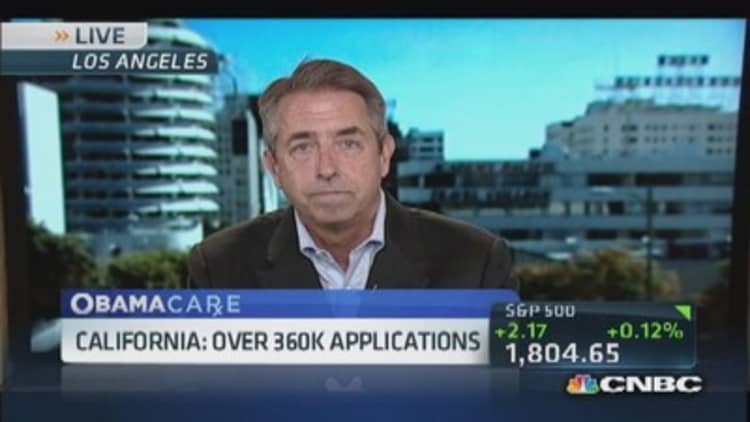The federal government wants to throw insurers selling Obamacare plans a financial bone to make up for another tweak to the controversial health-care reform law.
In 255 pages of documents released Monday, the Health and Human Services Department said it wants to have an insurer-fund pot of money cover more of some insurers' costs related to benefits from Obamacare policies next year. Officials proposed reducing the money insurers pay for each person insured under those plans to fund the reinsurance pot.
An Obama administration official, who asked not to be identified, said insurers might get an extra $2 billion to $3 billion in reinsurance payouts in 2014 under the proposed rule changes, with no net cost to the federal government.
(Read more: GoHealth creates Obamacare enrollment workaround)
The changes are being made because of President Barack Obama's recent decision to let insurers choose to continue offering existing customers plans that are not compliant with the Affordable Care Act, which sets certain minimum standards for benefits.
Citi Research equities analyst Carl McDonald issued a report on the changes Tuesday titled, "I am altering the Deal. Pray I don't alter it any further."
Most of the proposed changes "are favorable to insurers," he noted.
David Axene, a fellow of the Society of Actuaries, said, "If you're participating in the [Obamacare] exchanges, you're getting more protection from the government than you thought you were, and you're getting a rate reduction for next year."
The revisions to ACA rules in the past year have generally increased the potential risk that insurers have in selling plans on the government-run exchanges.
"This tends to alleviate some of that," Axene said. "These are some last-minute tweakings and ease some of the complaints by the carriers ... [and] their concerns about being stuck with some of these risks."
"I don't know that it alleviates all of their concerns," he added. "It's a step toward it."
Under the proposed rules for just 2014, the reinsurance fund would begin reimbursing insurers for 80 percent of the cost of claims over $45,000, versus the current minimum of $60,000. The maximum amount of benefits covered by the fund would remain $250,000. The fund is set at $10 billion for 2014, and decreases thereafter until it expires after 2016.
(Read more: Obamacare tech team tackles turkey of a Web site on Thanksgiving)
The government also said it might pay more than 80 percent if it ends up with more cash in a reinsurance pool funded by Obamacare enrollments.
The U.S. also wants to slash the per-capita reinsurance fee that insurers pay for their Obamacare enrollees to $44 in 2015 from $63 currently. In addition, it is considering paying insurers more under a "risk corridor" program, which would reimburse them for disproportionate enrollment by sicker people.

The president's move two weeks ago to effectively allow grandfathering of non-ACA-compliant plans for another year came after he was criticized for claiming that Americans could keep an existing plan when the ACA went into effect. Dismal enrollment numbers on HealthCare.gov, the federally run plan marketplace used in 36 states, also spurred the action.
But the decision increased the chances that younger, healthier people would choose to keep cheaper plans and not enroll in a new plan from one of the exchanges.
The executive summary of the proposed rule changes said, "If lower health risk individuals remain in a separate risk pool, the transitional policy could increase the issuer's average expected claims for cost for plans that comply with 2014 market rules."
"An increase in expected claims could lead to unexpected losses," the summary said.
Insurers, who have been whipsawed by repeated tweaks to Obamacare regulations, were cautious yesterday when asked for comment on the latest batch—despite the ostensible result of their getting them money.
Officials at America's Health Insurance Plans, a trade group, were still reviewing the proposals.
AHIP spokesman Robert Zirkelbach said, "We appreciate that the administration is taking steps to stabilize the market and minimize disruption for consumers."
Judiemarie Thomas, a spokeswoman for Independence Blue Cross, said, "These new regulations are complex, and we need to spend time reviewing them and understanding their implications on our company."
Humana and Florida Blue both referred calls for comment to AHIP, while WellPoint and Aetna said they are still reviewing the rules.
(Read more: Enrolling with the oldies: California's "gray" Obamacare exchange)
McDonald at Citi wrote that the proposals' effect on the stock prices of publicly traded insurers will likely be minimal.
"Most of the publicly traded plans have little existing exposure to the individual market, while the [government-run] exchange participation of several plans is quite limited in 2014," he wrote.
"As is almost always the case, it seems likely that the direction of the medical cost trend will have a far larger impact on managed care stock prices next year than anything else."
—By CNBC's Dan Mangan, with additional reporting by Jodi Gralnick and Bertha Coombs. Follow Mangan on Twitter @_DanMangan


